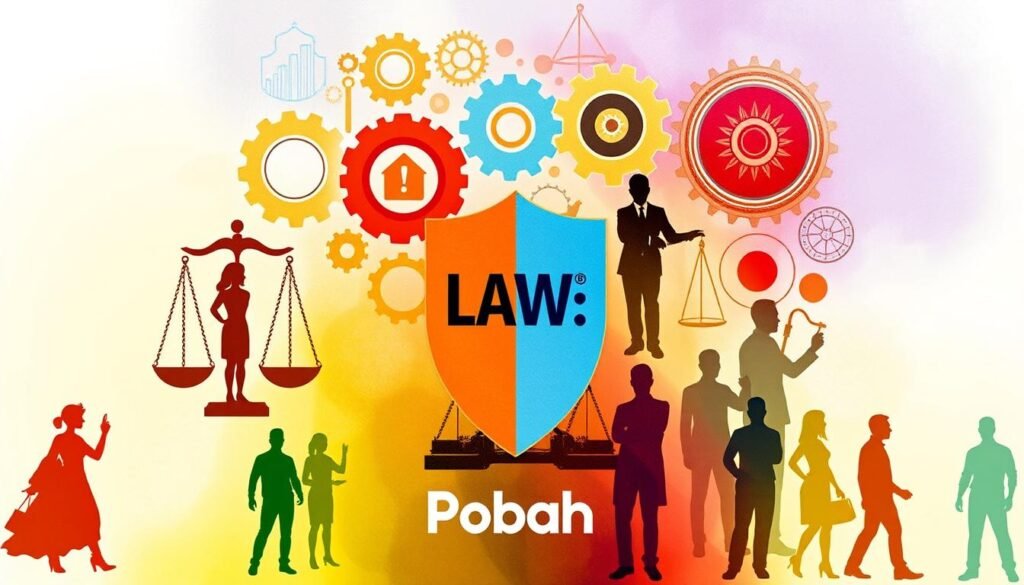Knowing your rights at work is key today. This guide helps you understand workers’ rights and how laws have changed in the U.S. You’ll learn about important laws that have shaped work rights over time. It’s important to know your rights to work safely and effectively.
Key Takeaways
- Workers’ rights are fundamental to a safe and fair work environment.
- Understanding employment law can help you advocate for yourself.
- Major legislative milestones have defined the evolution of workers’ rights.
- This guide aims to clarify your legal protections in the workplace.
- Knowledge of your rights is key to ensuring compliance from employers.
Introduction to Workers’ Rights
Workers’ rights are about fair treatment and safety at work. They help you do well in your job without being taken advantage of. Knowing about employment law is key, as it covers things like pay, hours, and safety.
Knowing your rights means you can stand up for yourself. You have the right to fair pay, safe work, and not be discriminated against. These rights are important for a fair work place.
Many people still face problems like unfair pay and bias at work. Learning about employment law helps you spot these issues. This knowledge helps you and others fight for better work conditions.

Understanding Employment Law: A Guide to Workers’ Rights and Protections
Employment law is a set of rules that protect employee legal rights and ensure fair work practices. It affects both workers and employers. Knowing these laws is key to getting along in the workplace.
Important laws like the Fair Labor Standards Act (FLSA) and the Family and Medical Leave Act (FMLA) help workers. They set standards for fair pay, hours, and leave. This is a big part of workers’ rights overview.
Workers can use these laws to stand up for themselves. Knowing your rights can make you happier and healthier at work.

Learning about employment law helps you fight for your rights. Here’s a table that shows key protections from important laws:
| Law | Main Protections | Applicable Rights |
|---|---|---|
| Fair Labor Standards Act (FLSA) | Minimum wage, overtime pay | Right to fair compensation for hours worked |
| Family and Medical Leave Act (FMLA) | Job-protected leave for family and medical reasons | Right to take leave without losing your job |
| Occupational Safety and Health Act (OSHA) | Safe working conditions | Right to work in an environment free from hazards |
| Equal Employment Opportunity Commission (EEOC) | Protection from workplace discrimination | Right to fair treatment regardless of race, gender, or disability |
Knowing these laws helps you deal with work challenges. It strengthens your position at work.
What Are Workers’ Rights?
Knowing about workers’ rights is key in the job world. These rights keep you safe from unfair treatment and make sure you get paid right. An employee rights summary lists the rights workers have, making work places fair and safe. Learning about these rights helps you stand up for yourself and spot any unfair treatment.
Overview of Employee Rights
Workers have basic rights that protect their health and respect at work. Some important rights include:
- The right to fair pay for all hours worked, including overtime and minimum wage.
- The right to a safe work environment, free from hazards that could cause injury or illness.
- The right to join or form trade unions to advocate for collective bargaining.
- The right to take leave for specific circumstances, such as medical needs or family emergencies.
- The right to be free from discrimination and harassment based on race, gender, religion, or other protected statuses.
Legal Protections for Workers
Many federal and state workplace laws give workers important legal protections. For example, the Fair Labor Standards Act (FLSA) sets rules for minimum wage and overtime. Also, laws like the Occupational Safety and Health Act (OSHA) ensure safe working conditions. Key legal protections include:
| Protection Type | Description | Relevant Law |
|---|---|---|
| Wrongful Termination | Protection against being fired without cause or legal reason. | Employment-at-will doctrine, various state laws |
| Worker’s Compensation | Benefits for employees injured on the job, covering medical expenses and lost wages. | State worker’s compensation laws |
| Discrimination Protections | Rights protecting employees from unfair treatment based on personal characteristics. | Civil Rights Act, Age Discrimination in Employment Act |
Knowing about these legal protections for workers and the rights under workplace laws helps you protect your job interests better.

Common Employment Laws in the United States
Understanding employment laws overview is key for employers and employees. These laws ensure fair treatment and outline worker rights. Knowing key federal employment regulations and state laws is crucial for the complex labor landscape.
Key Federal Employment Regulations
Several federal laws protect workers. The Fair Labor Standards Act (FLSA) sets minimum wage and overtime. The Occupational Safety and Health Act (OSHA) ensures workplace safety. The Equal Employment Opportunity Commission (EEOC) fights against discrimination.
| Regulation | Focus Area | Key Features |
|---|---|---|
| Fair Labor Standards Act (FLSA) | Minimum Wage & Overtime | Sets national standards for minimum wage and overtime pay |
| Occupational Safety and Health Act (OSHA) | Workplace Safety | Promotes safe working environments and sets safety regulations |
| Equal Employment Opportunity Commission (EEOC) | Anti-Discrimination | Enforces laws against workplace discrimination |
State-Level Employment Laws
State laws offer extra protections beyond federal laws. They cover workers’ compensation, family leave, and wage laws. It’s important to know both state and federal laws to protect your rights.

Understanding Discrimination Laws
Workplace discrimination comes in many forms. Laws are in place to protect you from unfair treatment. Knowing about these laws is key to understanding your rights and protections.
It’s important to know when you might be facing discrimination. This way, you can take the right steps to address it.
Types of Workplace Discrimination
There are several types of discrimination recognized by laws. These include:
- Race: Treating individuals differently based on their race or ethnic background.
- Gender: Unequal treatment based on an employee’s gender, including issues related to pregnancy.
- Age: Discrimination against employees over the age of 40, known as age discrimination.
- Disability: Unfair treatment of individuals with disabilities that are covered under the Americans with Disabilities Act.
- Religion: Disparities in treatment due to an employee’s religious beliefs or practices.
How to Report Discrimination
If you face discrimination at work, it’s important to act. Here’s how to report it effectively:
- Document Everything: Keep detailed records of incidents, including dates, times, witnesses, and descriptions of discriminatory behavior.
- Review Company Policies: Familiarize yourself with your employer’s policy regarding discrimination and reporting procedures.
- Report to HR: Speak with your Human Resources department to file a formal complaint. Ensure you follow the necessary protocols.
- Contact the EEOC: If internal processes do not resolve the issue, consider filing a complaint with the Equal Employment Opportunity Commission. They provide guidance and legal support for workplace discrimination concerns.
Understanding labor laws related to discrimination helps you protect your rights. These protections are crucial for a fair work environment.
Employee Benefits and Protections
Knowing about employee benefits is key to doing well at work. Benefits like health insurance, retirement plans, and paid leave are important parts of your pay. It’s crucial to know what’s available and your rights to these benefits.
Understanding Employee Benefits
Employee benefits help make your job better and support your well-being. Employers often offer:
- Health insurance
- Retirement savings plans like 401(k) accounts
- Paid vacation and sick leave
- Disability insurance
- Life insurance
- Flexible spending accounts
These benefits can greatly affect your money and personal life. As an employee, it’s important to learn about the benefits your employer offers.
Legal Protections for Employee Benefits
The law protects your benefits rights. Knowing about employment laws can help a lot. A big law is the Employee Retirement Income Security Act (ERISA). It makes sure retirement plans work for you.
ERISA and other laws require certain benefits based on your job or how long you’ve worked. Knowing your rights helps you get the benefits you should have. It’s a big step in making sure you get everything your employer offers.
Employer Responsibilities Under Employment Law
Knowing what employers must do is key to a good work place. Employers have big roles under employment law. A clear look at these roles shows why following the rules is so important.
First, employers must keep the workplace safe for everyone. This means dealing with health risks and giving out safety gear. Not doing this can lead to legal trouble and fines.
Another big thing is paying employees fairly. Following the minimum wage laws is a must. Employers also need to pay on time to build trust and reliability in the team.
Keeping the workplace free from bias is also vital. Laws protect workers from unfair treatment based on things like race, gender, and religion. Employers should focus on diversity and inclusion to keep a good work atmosphere.
If employers don’t meet these duties, the results can be bad. Lawsuits can cost a lot and hurt the company’s image. Taking care of your workers’ rights helps everyone work better and feel better about their job.
| Employer Responsibility | Consequences of Non-Compliance |
|---|---|
| Providing a Safe Workplace | Legal liabilities, penalties, and increased insurance costs |
| Paying Minimum Wage | Fines, back pay claims, and potential lawsuits |
| Upholding Non-Discrimination Laws | Legal actions and damage to company reputation |
In the end, knowing your part in following labor laws can really change the work place for the better.
Labor Law Basics: An Overview for Employees
Knowing the basics of labor law is key for every worker. Learning about these laws helps you understand your rights and duties at work. You have important rights under labor laws, from collective bargaining to being represented. A good overview of labor laws can help you know what you’re entitled to at work.
Key Labor Regulations to Know
The National Labor Relations Act (NLRA) is crucial for protecting your rights. It lets you join or form unions and take part in making decisions for the workplace. Here’s a table that shows important regulations and what they mean for you:
| Regulation | Description | Employee Rights |
|---|---|---|
| National Labor Relations Act (NLRA) | Protects employees’ rights to organize unions and engage in collective bargaining. | Right to form or join a union without employer interference. |
| Wagner Act | Strengthens labor union rights and prohibits unfair labor practices. | Right to participate in collective negotiations. |
| Taft-Hartley Act | Limits union activities and protects individual employees. | Right to refrain from union membership if preferred. |
By understanding these labor law basics, you can fight for your rights at work. Knowing employment law is vital for making smart choices about your job and benefits. Stay informed and active in your career for a fair and just workplace.
Workplace Safety Regulations
Workplace safety is very important for everyone’s health. The Occupational Safety and Health Administration (OSHA) sets standards for safe work places. It makes sure workers don’t face dangers that could hurt them.
Knowing the safety laws is key. These laws protect you and make sure employers follow fair rules. If employers don’t follow these laws, they might face penalties.
It’s important to know what makes a workplace safe. Here are some key things:
- Reliable safety equipment and training.
- Regular inspections and maintenance of machinery.
- Clear communication regarding safety procedures.
- Access to proper emergency protocols.
If you see something unsafe, you can report it. Employers must fix any hazards quickly. As an employee, you can:
- Document the unsafe condition with evidence such as photographs.
- Notify your supervisor or the safety officer immediately.
- If no action is taken, you can file a complaint with OSHA.
Knowing your rights helps make the workplace safer for everyone. It’s about empowering yourself and others to work in a safe environment.
| Safety Element | Description | Employee’s Right |
|---|---|---|
| Safety Equipment | Access to necessary protective gear. | Right to refuse unsafe work. |
| Training | Comprehensive safety training and education. | Right to be informed about workplace hazards. |
| Inspections | Regular health and safety inspections. | Right to participate in safety discussions. |
| Emergency Protocols | Clear instructions for emergencies. | Right to access emergency exits at all times. |
Know Your Rights at Work
It’s crucial to know your rights at work for a fair and respectful place. You need to understand your rights and how to speak up for yourself. This helps protect your legal rights in the workplace.
How to Advocate for Yourself
Advocating for yourself involves several steps:
- Document Everything: Keep records of important communications, like emails and meeting notes. This helps you make your case if needed.
- Understand Your Rights: Learn about policies, procedures, and laws that apply to you. Knowing your rights is key for talking to your employer.
- Communicate Effectively: Talk to your employer or HR with clear and respectful words. Share your concerns and ask about your legal rights.
- Seek Legal Assistance: Sometimes, you might need a lawyer. They can guide you on your rights and responsibilities.
- Utilize Support Resources: Look into local labor unions or groups that support workers. They can provide help and resources.
Remember, the right approach can change based on your situation. Using the right tools and information helps you handle issues confidently and protects your rights.
| Advocacy Strategy | Description |
|---|---|
| Document Everything | Keep written records of conversations and correspondence that pertain to your rights. |
| Understand Your Rights | Research and familiarize yourself with employee rights in your organization. |
| Communicate Effectively | Use clear and respectful language when discussing concerns with employers. |
| Seek Legal Assistance | Consult a lawyer for advice regarding complex employee rights issues. |
| Utilize Support Resources | Engage with labor unions or groups that advocate for worker rights. |
Conclusion
In this workers’ rights handbook, you’ve learned a lot about employment law. You now know what workers’ rights are and how to deal with federal and state laws. This knowledge helps you stand up for your rights at work.
Staying informed about employment law helps you spot and address any issues. This guide is your go-to for all work-related questions. Keeping up with law changes is key to protecting your rights and benefits.
Knowing your rights is important, but it’s also about acting on them. If you think your rights have been broken, get help right away. You deserve a fair and supportive work environment.
FAQ
What are workers’ rights?
Workers’ rights are the legal protections and benefits employees get at work. They include fair pay, safe workspaces, and the right to join unions. This ensures workers are treated fairly and have a say in their work conditions.
How does employment law protect employees?
Employment law keeps employees safe from unfair treatment and exploitation. It sets standards for wages, hours, safety, and benefits. This makes sure employers follow the law and treat workers right.
What should I do if I experience workplace discrimination?
If you face discrimination at work, document everything and gather evidence. Then, tell your employer or HR. If it doesn’t stop, you can file a complaint with the EEOC or get legal help.
What benefits are employees entitled to?
Employees get benefits like health insurance, paid leave, and retirement plans. What you get depends on laws and your employer’s policies. Always check your handbook or talk to HR.
What are employers required to provide?
Employers must provide a safe work environment, fair wages, and follow overtime laws. They also have to respect workers’ right to organize and bargain together.
How can I understand my rights at work?
To know your rights, look at employment laws, your handbook, and talk to HR. You can also get advice from legal resources and labor unions. Knowing the laws helps you stand up for yourself.
What do I do if my rights have been violated at work?
If you think your rights are being broken, document everything. Tell your manager or HR. If it doesn’t get fixed, contact labor rights groups or a lawyer.
What are fair labor practices?
Fair labor practices protect workers from being taken advantage of. They include fair pay, reasonable hours, and safe conditions. These follow the laws to ensure workers are treated fairly.
How can I report unsafe working conditions?
To report unsafe conditions, first tell your employer. If they don’t fix it, report it to OSHA. They check if workplaces are safe.
What is employee legal protection?
Legal protections for employees keep them safe from unfair treatment and ensure fair treatment. They cover wages, benefits, and safety. These laws help prevent discrimination and harassment.



